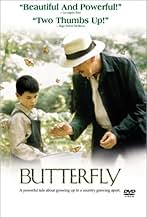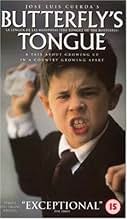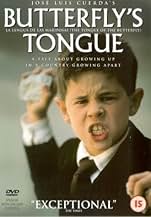CALIFICACIÓN DE IMDb
7.6/10
10 k
TU CALIFICACIÓN
España, 1936. Moncho empieza su primer año de colegio al tiempo que la República es atacada por los rebeldes fascistas y su profesor tomado como enemigo del fascismo.España, 1936. Moncho empieza su primer año de colegio al tiempo que la República es atacada por los rebeldes fascistas y su profesor tomado como enemigo del fascismo.España, 1936. Moncho empieza su primer año de colegio al tiempo que la República es atacada por los rebeldes fascistas y su profesor tomado como enemigo del fascismo.
- Dirección
- Guionistas
- Elenco
- Premios
- 6 premios ganados y 19 nominaciones en total
Elena Bagutta
- Carmiña
- (as Elena Fernández)
Roberto Vidal Bolaño
- Boal
- (as Roberto Vidal)
Antonio Lagares
- Alcalde
- (as Tucho Lagares)
- Dirección
- Guionistas
- Todo el elenco y el equipo
- Producción, taquilla y más en IMDbPro
Opiniones destacadas
It's a beautiful (and too rare) thing to witness a child actor who can avoid the saccharine cutesiness so common to mainstream American child actors. In this film full of children there are, happily, no cloying, exaggerated "cute kid" moments.
The real beauty of La lengua de las mariposas is what's unspoken -- the truths that remain between the lines. The film's political theme is never heavy-handed, and its vivid and fascinating depiction of a turbulent moment in Spanish history has inspired in me a desire to learn more. Without spoiling the ending (which I read as fairly subversive, at least to an American audience), I must say I wasn't entirely surprised at what happened. It brought a tear to my eye and it's still making me think, three days later.
Those who liked this film should also see La Vita e Bella (Life Is Beautiful) and La notte di San Lorenzo (Night Of Shooting Stars), which are similar and may appeal equally, if not more.
The real beauty of La lengua de las mariposas is what's unspoken -- the truths that remain between the lines. The film's political theme is never heavy-handed, and its vivid and fascinating depiction of a turbulent moment in Spanish history has inspired in me a desire to learn more. Without spoiling the ending (which I read as fairly subversive, at least to an American audience), I must say I wasn't entirely surprised at what happened. It brought a tear to my eye and it's still making me think, three days later.
Those who liked this film should also see La Vita e Bella (Life Is Beautiful) and La notte di San Lorenzo (Night Of Shooting Stars), which are similar and may appeal equally, if not more.
I give this movie 10 points and even Woody Allen said he liked it. It's a very touching story about a child and his teacher in the period previous to the Spanish civil war. The movie is based on a novel , the screenplay is almost perfect .The performances , specially but one of the best Spanish actors ever Fernando Fernan Gomez as the teacher is amazing and one you will remember for a long long time and the child Manuel Lozano is at the same quality level of performance . I have seen this movie only once and I still remembered it now. José Luis Cuerda , the director , do a very good job and Alejandro Amenabar wrote the soundtrack.The characters are so well constructed you will identify with them. I recommend this movie . Don't miss it .
This was a film that really tugged at the heart strings. I really enjoyed the building of characters and the way the lives of the village were portrayed. It was a difficult time politically, yet the simplicity of daily life and family in Galicia was the over-riding story here. The acting is second to none and Manuel Lozano was unbelievably fantastic! I mean these ridiculous "affected" children they get for American movies (i.e. the "Pepsi" girl) are so unbelievable and fake. Manuel is so realistic as Moncho. So are the other actors.
I don't necessarily agree with the way that Cuerda rushed the ending, but I certainly wouldn't want to take away any time in portraying the lives of everyone involved. Maybe he should have made it a little longer as not to rush the ending. Although I will say that one of my favorite things about foreign films is that they are so NOT "Hollywood" that you never really know what to expect. Unlike the trite, unbelievable, over-acted, high budget American films and their overpaid actors which usually just leave a bad taste when I exit from the theatre.
This is an historical piece that absolutely shames "the Patriot". It's so nice to see that a movie doesn't have to change history to show us the past and entertain us at the same time!
I don't necessarily agree with the way that Cuerda rushed the ending, but I certainly wouldn't want to take away any time in portraying the lives of everyone involved. Maybe he should have made it a little longer as not to rush the ending. Although I will say that one of my favorite things about foreign films is that they are so NOT "Hollywood" that you never really know what to expect. Unlike the trite, unbelievable, over-acted, high budget American films and their overpaid actors which usually just leave a bad taste when I exit from the theatre.
This is an historical piece that absolutely shames "the Patriot". It's so nice to see that a movie doesn't have to change history to show us the past and entertain us at the same time!
Adapted by screenwriter Rafael Azcona from three stories in Manuel Rivas novel "Que Me Quieres, Amor", Butterfly is a rare and insightful coming-of-age story that takes place in a rural part of northern Spain during the Second Republic when Spain had a brief flirtation with socialism and democracy. Against a background of the growing clouds of the Spanish Civil War, the film depicts the relationship between asthmatic 7-year old Moncho (Manuel Lozano) and his liberal schoolteacher played by the great Spanish actor Fernando Fernan Gomez (All About my Mother, The Grandfather).
Butterfly does not directly involve politics (at least until the end) but tells its story through snapshots of young Moncho, In the beginning, he is a quiet, shy boy who is afraid go to school because he thinks his teacher, Don Gregorio, will hit him. Gregorio, however, is a kind spirit who teaches his students to appreciate poetry, the beauty of nature, and the spirit of loving one another. Moncho grows from a frightened child to an enthusiastic young boy who is eager to learn all that he can about life. He divides his time between following his older brother's exploits playing the saxophone in a local band and chasing butterflies with his teacher friend. The butterfly here seems to be a symbol both of freedom and transformation.
I felt very involved with this young boy's world and found Lozano to be one of the most beguiling child actors that I have seen in a long time. His performance alone saves the film from Miramax-type sentimentality (which it occasionally drifts towards). Gomez is also wonderful as the compassionate teacher, symbolizing the humanitarian government that Spain enjoyed before the onset of fascism.
Eventually, Moncho must choose between his love for the teacher who opened his eyes to the beauty and wonder of the natural world and the ugly pressures of his family and neighbors to take sides in the political conflict. With the ending as shocking and memorable as Truffaut's The 400 Blows, Butterfly powerfully illuminates the human cost of war.
Butterfly does not directly involve politics (at least until the end) but tells its story through snapshots of young Moncho, In the beginning, he is a quiet, shy boy who is afraid go to school because he thinks his teacher, Don Gregorio, will hit him. Gregorio, however, is a kind spirit who teaches his students to appreciate poetry, the beauty of nature, and the spirit of loving one another. Moncho grows from a frightened child to an enthusiastic young boy who is eager to learn all that he can about life. He divides his time between following his older brother's exploits playing the saxophone in a local band and chasing butterflies with his teacher friend. The butterfly here seems to be a symbol both of freedom and transformation.
I felt very involved with this young boy's world and found Lozano to be one of the most beguiling child actors that I have seen in a long time. His performance alone saves the film from Miramax-type sentimentality (which it occasionally drifts towards). Gomez is also wonderful as the compassionate teacher, symbolizing the humanitarian government that Spain enjoyed before the onset of fascism.
Eventually, Moncho must choose between his love for the teacher who opened his eyes to the beauty and wonder of the natural world and the ugly pressures of his family and neighbors to take sides in the political conflict. With the ending as shocking and memorable as Truffaut's The 400 Blows, Butterfly powerfully illuminates the human cost of war.
I've been watching a lot of films in Spanish lately, trying to prepare for a course I will be teaching on Love in Hispanic Cinema. I'm searching for the film I can show that will exemplify love of country... and while I don't think this is the one I'm looking for, it may work insofar as the "love of Spain" expressed resonates with the same propagandistic tones similar expressions of "patriotism" so often do.
I won't bore you with the basics of plot nor repeat what everyone else has already said as you can read the intro and a hand-full of other posts and know enough. I will tell you that this is a subtle film. We in the US are so used to being hit over the head by our movies that watching this film is like feeling a soft breeze. It's oh so quietly disquieting.
I have found interesting the posts reviewing this film that criticize the "meanderings" of the plot --how far the dispersed elements take us away from the core message. But I ask, what is not childhood but a collection of fascinating and disconnected pieces of a puzzle that we can't put together quite yet. Music, love, family, sex, food, school, friends, women and girls, books, nature, teachers and grown men -all equally interesting and engaging to a young boy. But when he's all of maybe seven, what does he know about how they all relate to each other? What do any of us really know about how all the pieces of our lives fit together, or what they mean?
I especially enjoyed the sad quality of all the varied losses interwoven in the greater story; they tempered the otherwise hopeful mood of the film. The overall effect on me was that I understood that loss is comprised not only of one deep cut but of a thousand little ones too. It wasn't only the dream of a Republican and free Spain that was lost; it was much more that was lost as well.
The film-making here is exquisite too, like a butterfly, so beautiful visually; "La lengua de las mariposas" is so well executed that it truly feels real. There were no moments when I said to myself "oh, come on," as I do when I feel I've been taken for too stupid to figure things out for myself, when everything has been made too obvious, predigested for me by the movie makers.
Amazingly the child actor is believable at all times -never too precocious, never too coy. An excellent performance from a child actor is always a delight. See the Argentine film "Valentin" (2002) for another.
Others write that the ending is shocking, too abrupt and that the audience is neither prepared for it nor guided towards it. For me that is the perfect ending because it replicates the shock of the civil war to the Spaniards, and the shock adult violence inflicts upon childhood. For me, the abrupt ending was the radical interruption traditional Spain forced upon everyone's future. Never mind, as one post suggested that in Republican Spain the communists had taken over and democracy was no longer in effect. Democracy here is the exotic Chinese beauty Andrés falls in love with, a fantasy out of reach, silenced and taken hostage by a brute.
See this film and decide for yourself.
I won't bore you with the basics of plot nor repeat what everyone else has already said as you can read the intro and a hand-full of other posts and know enough. I will tell you that this is a subtle film. We in the US are so used to being hit over the head by our movies that watching this film is like feeling a soft breeze. It's oh so quietly disquieting.
I have found interesting the posts reviewing this film that criticize the "meanderings" of the plot --how far the dispersed elements take us away from the core message. But I ask, what is not childhood but a collection of fascinating and disconnected pieces of a puzzle that we can't put together quite yet. Music, love, family, sex, food, school, friends, women and girls, books, nature, teachers and grown men -all equally interesting and engaging to a young boy. But when he's all of maybe seven, what does he know about how they all relate to each other? What do any of us really know about how all the pieces of our lives fit together, or what they mean?
I especially enjoyed the sad quality of all the varied losses interwoven in the greater story; they tempered the otherwise hopeful mood of the film. The overall effect on me was that I understood that loss is comprised not only of one deep cut but of a thousand little ones too. It wasn't only the dream of a Republican and free Spain that was lost; it was much more that was lost as well.
The film-making here is exquisite too, like a butterfly, so beautiful visually; "La lengua de las mariposas" is so well executed that it truly feels real. There were no moments when I said to myself "oh, come on," as I do when I feel I've been taken for too stupid to figure things out for myself, when everything has been made too obvious, predigested for me by the movie makers.
Amazingly the child actor is believable at all times -never too precocious, never too coy. An excellent performance from a child actor is always a delight. See the Argentine film "Valentin" (2002) for another.
Others write that the ending is shocking, too abrupt and that the audience is neither prepared for it nor guided towards it. For me that is the perfect ending because it replicates the shock of the civil war to the Spaniards, and the shock adult violence inflicts upon childhood. For me, the abrupt ending was the radical interruption traditional Spain forced upon everyone's future. Never mind, as one post suggested that in Republican Spain the communists had taken over and democracy was no longer in effect. Democracy here is the exotic Chinese beauty Andrés falls in love with, a fantasy out of reach, silenced and taken hostage by a brute.
See this film and decide for yourself.
¿Sabías que…?
- TriviaOn one of their walks home (at 0:38:41), Moncho asks Andrés whether he knows what a tilonorrinco is and proceeds to talk about an Australian bird. In Spanish tilonorrinco is what in English is called the satin bowerbird (Ptilonorhynchus violaceus), a bowerbird endemic to eastern Australia.
- Bandas sonorasEn er mundo
Written by Juan Quintero (as Juan Quintero Muñoz) and Jesús Fernández Lorenzo
Selecciones populares
Inicia sesión para calificar y agrega a la lista de videos para obtener recomendaciones personalizadas
- How long is Butterfly?Con tecnología de Alexa
Detalles
- Fecha de lanzamiento
- País de origen
- Sitio oficial
- Idiomas
- También se conoce como
- Butterfly
- Locaciones de filmación
- Productoras
- Ver más créditos de la compañía en IMDbPro
Taquilla
- Total en EE. UU. y Canadá
- USD 2,092,682
- Total a nivel mundial
- USD 7,738,129
- Tiempo de ejecución
- 1h 36min(96 min)
- Color
- Mezcla de sonido
- Relación de aspecto
- 2.35 : 1
Contribuir a esta página
Sugiere una edición o agrega el contenido que falta


















